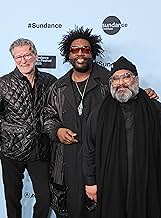Sly Lives! (aka the Burden of Black Genius)
- 2025
- 1h 52m
IMDb RATING
7.6/10
1.3K
YOUR RATING
It focuses on the life and legacy of Sly and the Family Stone, telling the story behind the rise, reign and fadeout of one of pop music's most influential artists.It focuses on the life and legacy of Sly and the Family Stone, telling the story behind the rise, reign and fadeout of one of pop music's most influential artists.It focuses on the life and legacy of Sly and the Family Stone, telling the story behind the rise, reign and fadeout of one of pop music's most influential artists.
- Nominated for 1 Primetime Emmy
- 4 nominations total
Sly Stone
- Self - Singer, Sly & The Family Stone
- (archive footage)
Cynthia Robinson
- Self - Trumpet, Sly & The Family Stone
- (archive footage)
Featured reviews
Wow! Absolutely phenomenal storytelling of the rise, fall and everlasting impact of the musical genius, Sly Stone! This documentary poses the question, is Black Genius a burden? That is, did society's attempt to pigeonhole Sly Stone to be THE SPOKESPERSON/CELEBRITY for the Black community, who is expected to align to the Black struggle/issues, create inner turmoil that led to Sly Stone's emotional and physical breakdown and musical retreat. Some of those interviewed think that may have been the case. White artists, on the other hand, have freedom to experiment with different musical genres and different personas (think David Bowie/ Ziggy Stardust), and Madonna (and her many reincarnations), without having to walk this line of aligning their celebrity/music to be THE-SPOKESPERSON for their communities. Thus, did this duality become a burden that contributed to Sly's insecurities, drug-fueled lifestyle and ultimate downfall? Questlove does a great job of trying to answer the question and highlighting Sly Stone's musical genius. He documents his rise from a San Francisco DJ to a true trailblazer in forming a multi- racial, male/female band that fuses, rock, R&B, and the Brits sound. Questlove opens the vault and presents a treasure of archival tapes and interviews with Sly Stone and his band. And there are plenty of current interviews with the band members and musical artists who have been heavily influenced by Sly Stone. It's evident Sly will and has had a lasting impression on the world of music and many musical protégés, including Prince and many rappers, who are still sampling his music today. The documentary ends on a bittersweet note, as Sly Stone is shown as he is today. A frail, elderly man, who is pictured alone and with his children and grandkids. However, his music is forever. Sly Lives!
This is fine and will do the job as placeholder. It's in the standard format of blending clips, stills, archive footage, with contamporaries being interviewed, to take us through a famous life, the ups and downs and perhaps lessons involved.
Here it's Sly Stone, who oould have been a Prince of sorts. Theatric, multifaceted, but it was the civil rights years, and his creative life mirrors that trajectory; ebullient hope to transcend boundaries, to bitterly dashed dreams.
One lesson, and it's generally offered, is that there was no scaffold, blueprint, on which to know what to do build next, how to play the role of superstar. He, along with everybody else, had to make it up as they went along. Another talking point here is 'black' genius, the particular tolls of it in a world where boundaries are drawn starkly against you.
There may be parallels with someone like Brian Wilson; 'genius' in being able to perceive music as visual world, as shared streets you explore, but limited in the means, work, and focused commitment required to consistently bring it to life.
At least his Riot album is as important as anything from the time, a dissonant extended improvisation on previous fabric of soul music, and that as mirroring a dissonant collapsing America. It's probably a cornerstone for all black music that followed.
My own takeaway is of a man who in terms of vision was second to none of the greats of the era; adept at improvising self, savvy enough to be able to see the larger fabric.
But there's no real stage for him to move to, fails to transcend, and probably had plenty of reasons against him. The drugs were probably ways to dissociate, make believe he was what he couldn't summon. So he periodically returns as caricature of himself, clowning it for the camera, unsure how to be the next version of himself.
Meanwhile, just as he was cratering, Bronx and Harlem youths were rediscovering him in record stores, and were about to speak once more about what he used to; the world of stark limits, and yet somehow joyful dance, ironically cruising through cracks. Interestingly, the new music, hip hop, would eschew the whole band format, and pare it down to narrator and rousing, sometimes soulful breaks that suggest world.
Here it's Sly Stone, who oould have been a Prince of sorts. Theatric, multifaceted, but it was the civil rights years, and his creative life mirrors that trajectory; ebullient hope to transcend boundaries, to bitterly dashed dreams.
One lesson, and it's generally offered, is that there was no scaffold, blueprint, on which to know what to do build next, how to play the role of superstar. He, along with everybody else, had to make it up as they went along. Another talking point here is 'black' genius, the particular tolls of it in a world where boundaries are drawn starkly against you.
There may be parallels with someone like Brian Wilson; 'genius' in being able to perceive music as visual world, as shared streets you explore, but limited in the means, work, and focused commitment required to consistently bring it to life.
At least his Riot album is as important as anything from the time, a dissonant extended improvisation on previous fabric of soul music, and that as mirroring a dissonant collapsing America. It's probably a cornerstone for all black music that followed.
My own takeaway is of a man who in terms of vision was second to none of the greats of the era; adept at improvising self, savvy enough to be able to see the larger fabric.
But there's no real stage for him to move to, fails to transcend, and probably had plenty of reasons against him. The drugs were probably ways to dissociate, make believe he was what he couldn't summon. So he periodically returns as caricature of himself, clowning it for the camera, unsure how to be the next version of himself.
Meanwhile, just as he was cratering, Bronx and Harlem youths were rediscovering him in record stores, and were about to speak once more about what he used to; the world of stark limits, and yet somehow joyful dance, ironically cruising through cracks. Interestingly, the new music, hip hop, would eschew the whole band format, and pare it down to narrator and rousing, sometimes soulful breaks that suggest world.
Follows a very standard bio-doc template... rise-fall-redemption. But I really liked the thread of black genius and the pressure placed on America's very best black performers. Most of the archival interview footage with Sly Stone was really compelling. He has a very good way of expressing himself meaningfully without capitulating to the awful questions people asked him. Right at the midpoint of the film, around the time when Sly Stone's run of genius albums is about to take a darker, inward turn, there is an interview clip of Dick Cavett interviewing Stone, with Cavett being a total, well, dick. Sly's response properly shames Cavett... and all us as well.
A current documentary airing on Hulu from Oscar winner Questlove. Following the rise & eventual fall of Sylvester Stewart (Sly) & his band, we get a hallucinatory ascent of a mixed raced band who wowed audiences at Woodstock w/their mixture of rock & R & B which carried over to their many appearances on television at the time. Of course, one's demons reared its ugly head for Sly as his upward success came hand in hand w/his increasing drug use which by the time the late 70's rolled around the band were soon relegated to the past their prime heap but w/Questlove's expertise w/archival footage & interviews as well as modern takes on the band's output & influence from current songsmiths (Andre 3000 from Outkast, D'Angelo, Q-tip from A Tribe Called Quest) who put Sly & the Family Stone's music into righteous perspective.
This is better than nothing of course and I must say that if it wasn't for quest love, this documentary probably wouldn't have been made. At the same time he ruined to some degree what could've been a stellar documentary. Quest love's personal theory about the burden of being a black genius, doesn't make any sense nor was it needed. Especially when you're trying to push the narrative that Sly was one of the first people to undergo it publicly as if Little Richard and James Brown and Chuck Berry didn't exist. There's a case to be made that the directors views completely contradict that of sly stone and you can clearly see that there's a clash there. I pray to God, someone comes along, and does a better documentary where Sly is telling his own story. The idea that black artists deserve to enjoy the fruits of their labor and die with their kids around them while plenty ignoring that those same black artists were irresponsible with their money and chose drugs over being responsible parents, is trick knowledge.
Did you know
- ConnectionsFeatures The Dick Cavett Show: Episode dated 24 November 1970 (1970)
Details
- Release date
- Country of origin
- Language
- Also known as
- Sly Lives! El legado de un genio
- Production companies
- See more company credits at IMDbPro
- Runtime
- 1h 52m(112 min)
- Color
- Sound mix
Contribute to this page
Suggest an edit or add missing content





































